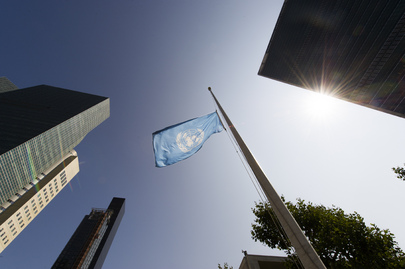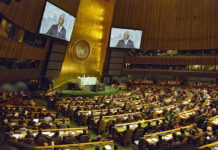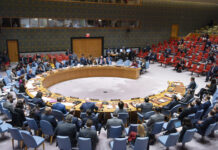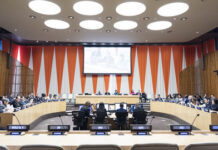This is the News in Brief from the United Nations.
‘Ten weeks of hell’ for children in Gaza: UNICEF
Gaza is by far the most dangerous place in the world to be a child and deaths of youngsters from disease will likely surpass those from bombardment in the absence of a ceasefire, the UN Children’s Fund (UNICEF) warned on Tuesday.
A lack of food, water, shelter and sanitation continues to put children’s lives at risk as they suffer under relentless airstrikes with no safe place to go, said UNICEF spokesperson James Elder, who recently returned from the enclave.
Ahead of a UN Security Council meeting expected to call for a pause in fighting to facilitate aid access, he told journalists in Geneva that “every single child is enduring these 10 weeks of hell and not one of them can escape”.
“As a parent of a critically sick little child told me: ‘Our situation is pure misery. I am overwhelmed… All we have is hope. I don’t know if we will make it through this. Please tell the world’.”
According to the Gaza health authorities, over 19,400 Palestinians have been killed in the enclave since the start of Israel’s retaliation for Hamas’ deadly terror attacks on 7 October, about 70 per cent of them women and children.
Over 52,000 Palestinians have been injured and their access to life-saving care is extremely limited. UN health agency WHO said on Tuesday that only eight of the 36 hospitals in the Strip are at least partially functional.
Ukraine: civilian death toll passes 10,000 amid ‘gross rights violations’: Türk
The “protracted and entrenched” conflict in Ukraine will impact lives and human rights for generations to come as evidence of gross violations of international law continues to be documented, UN rights chief Volker Türk said on Tuesday.
Briefing the UN Human Rights Council, Mr. Türk said that his Office has recorded and confirmed over 10,000 civilian deaths resulting from the conflict in Ukraine.
A further 18,500 civilians have been confirmed injured and “the true toll is probably substantially higher”, the High Commissioner added.
In territory controlled by Russian armed forces or occupied by Russia, 142 cases of summary execution of civilians have been documented since the beginning of the conflict, as well as “widespread” torture and ill-treatment of detainees including sexual violence and enforced disappearances, Mr. Türk said.
The UN rights chief pointed to an “extensive failure” by Russia to take adequate measures to protect civilians and deplored Russian missile strikes in densely populated residential areas, such as last week’s attacks on Kyiv.
Mr. Türk highlighted Russian missile attacks against grain storage and transport facilities “which… constitute protected civilian objects under international humanitarian law”. He underscored that over 1,300 education and health facilities have been damaged or destroyed since February 2022 and that only half of Ukraine’s children are able to attend in-person classes every day.
Sudan: humanitarian crisis deepens as new front opens in conflict: OCHA
Eight months into the conflict in Sudan, fighting has broken out in Wad Medani in Aj Jazirah state with “dramatic” consequences, the UN’s humanitarian affairs coordination office OCHA said on Tuesday.
Wad Medani has been a place of refuge for nearly half a million displaced people and has operated as a key humanitarian hub. Since fighting there started last Friday aid organisations have been forced to temporarily suspend operations until further notice and relocate to neighbouring states, OCHA said.
Preliminary information from UN migration agency (IOM) indicates that at least 250,000 people have fled Aj Jazirah state, “many in panic and with no other option than fleeing on foot”.
OCHA warned that if the violence continues, aid distribution to two million people, or a third of the population of Aj Jazirah state, will be compromised.
The area is already struggling with a cholera outbreak as healthcare facilities are stretched to the limit.
OCHA said that across the country 70 per cent of hospitals are out of function in conflict-affected states. Insecurity and bureaucratic impediments make aid access difficult while the humanitarian response plan for this year remains only 39 per cent funded.
Source of original article: United Nations (news.un.org). Photo credit: UN. The content of this article does not necessarily reflect the views or opinion of Global Diaspora News (www.globaldiasporanews.com).
To submit your press release: (https://www.globaldiasporanews.com/pr).
To advertise on Global Diaspora News: (www.globaldiasporanews.com/ads).
Sign up to Global Diaspora News newsletter (https://www.globaldiasporanews.com/newsletter/) to start receiving updates and opportunities directly in your email inbox for free.

































